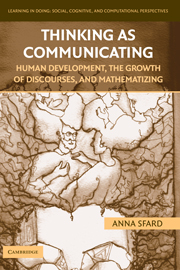Book contents
- Frontmatter
- Contents
- Series Foreword
- Introduction
- Acknowledgments
- Part I Discourse on Thinking
- 1 Puzzling about (Mathematical) Thinking
- 2 Objectification
- 3 Commognition: Thinking as Communicating
- 4 Thinking in Language
- Part II Mathematics as Discourse
- Glossary of Commognition
- References
- Name Index
- Subject Index
- Titles in the series
2 - Objectification
Published online by Cambridge University Press: 27 July 2009
- Frontmatter
- Contents
- Series Foreword
- Introduction
- Acknowledgments
- Part I Discourse on Thinking
- 1 Puzzling about (Mathematical) Thinking
- 2 Objectification
- 3 Commognition: Thinking as Communicating
- 4 Thinking in Language
- Part II Mathematics as Discourse
- Glossary of Commognition
- References
- Name Index
- Subject Index
- Titles in the series
Summary
The greatest magician … would be the one who would cast over himself a spell so complete that he would take his own phantasmagorias as autonomous appearances. … We (the undivided divinity operating within us) have dreamt the world. We have dreamt it as firm, mysterious, visible, ubiquitous in space and durable in time.
Jorge Luis BorgesThey recalled that all nouns … have only a metaphorical value.
Jorge Luis BorgesOur investigation is therefore a grammatical one. Such an investigation sheds light on our problem by clearing misunderstandings away. Misunderstandings concerning the use of words, caused, among other things, by certain analogies between the forms of expression in different regions of language.
Ludwig WittgensteinThe claim, made in the last chapter, that some foundational work may be needed before the resilient, long-standing quandaries can be resolved will now be reinforced by showing that these quandaries may, in fact, be the product of the way we speak. More specifically, it is posited that the source of the problem is in the way we think about human activities in general and, in particular, in the way we communicate with others and with ourselves about the activity of thinking, mathematical or otherwise. I am arguing that the different keywords around which the five quandaries revolve are not operational enough to ensure effective communication. I also show that most of them are metaphorical in nature, and metaphors are often like Trojan horses that enter discourses with hidden armies of unhelpful entailments.
- Type
- Chapter
- Information
- Thinking as CommunicatingHuman Development, the Growth of Discourses, and Mathematizing, pp. 34 - 64Publisher: Cambridge University PressPrint publication year: 2008



